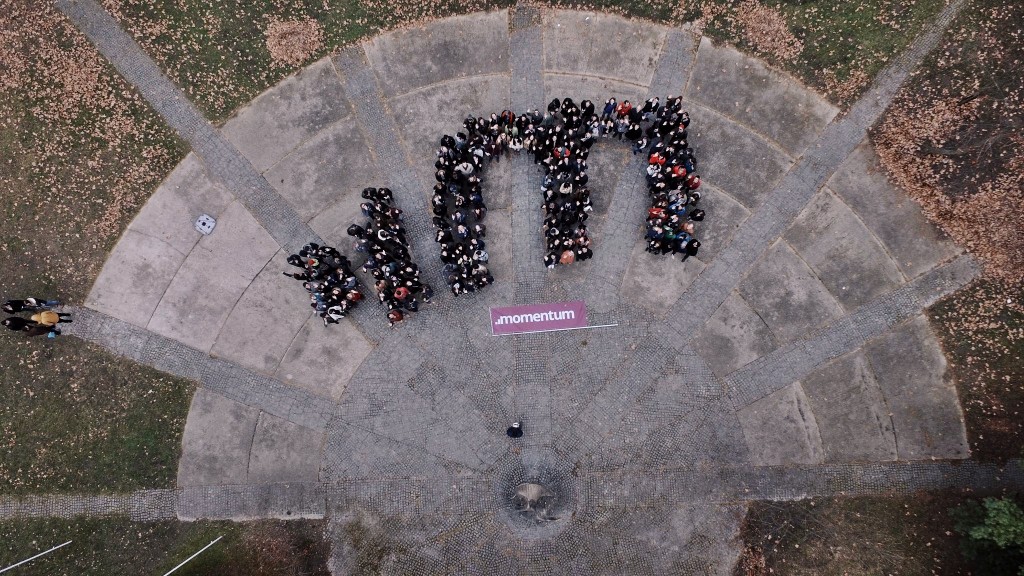The Hungarian political scene has been dominated by governing right-wing and populist Fidesz party and by the political apathy they have induced for most of the country. This has changed for a while when a new force – Momentum Movement – a group full of youngsters, emerged in the Hungarian political spectrum with their “Nolimpia” campaign, calling for a local referendum in Budapest as regards the country’s bid for the 2024 Olympic games. The new movement was not only able to gain 266,151 signatures (surpassing the required 138,000 by a large margin), but they were also capable of putting Fidesz to flight, since the governing party cancelled the country’s Olympics bid after the results of the Momentum’s campaign became public.
Since then, Momentum Movement announced its intention to become a party and to run in the 2018 general elections (where it is planning to put forward a candidate in every electoral district). Although the party does not want to define itself ideologically, they have identified three basic principles (opportunity, performance, and nation) and they try to politicize along these topics. During the Nolimpia campaign they named five main issues (healthcare, education, transport, living, and housing).
Moreover, they also believe that the parties should go beyond the left-right split of the society and learn from one another. For example, the left should emphasize patriotism more, while the right should adopt the left’s idea of solidarity.
As for the voters, Momentum also aims to attract the huge proportion of uncertain voters that wish to change the current government but cannot find a real alternative. The party’s main long-term goal is to complete the change of the regime, which – according to them – has not happened in 1989. They say Hungary needs a change of political culture too, where politics would mean caring for the public affairs and put a stop to the current negative associations, such as corruption.
Momentum tries to concentrate on several issues (as we saw with the “Nolimpia” campaign) in order to get the attention and mobilize the Hungarian people. It is going to be a long, bumpy road. The party also faces a number of obstacles.
Overcoming the Political Apathy
Although the Hungarian voting attitude can be descibed as apathetic, Momentum was able to mobilize voters for the collection of signatures over a short period of time. However, since 2010 nobody has been able to attract voters without party preference, and with such huge political apathy plus without media coverage it is going to be extremely difficult. After the “Nolimpia” campaign, the party is pushing for the exposure of the so-called “agent files” (which contain the names of previous Soviet agents before 1989), but has failed to achieve any progress so far. Therefore, it is not clear whether Momentum would be able to mobilize hesitant voters later on.
Getting Along with the “Old Opposition”
Momentum is also facing hostile attitude not only from the governing Fidesz party, but also from some of the main opposition parties. Most of the left-wing parties see a rival in Momentum and they will do everything to keep their own voters away from them. However, Momentum has also been very hostile towards the “old opposition” (as they call it), which is not necessarily a good strategy to “relieve” Prime Minister Viktor Orbán. Furthermore, new left-wing leader László Botka tries to speak to uncertain voters with his new leftist programme and he might succeed.
Avoiding the Fate of the Együtt Party
It is important for Momentum to avoid the fate of the centrist Együtt party, which started well by turning to uncertain voters. They even managed to garner more than 10% of popularity within a few months. However, after the initial enthusiasm the party started to weaken and was forced to collaborate with the other left-wing opposition parties in the 2014 general elections. In order for Momentum to avoid such a scenario and to achieve their main goal – which is the completion of the political transformation of 1989 – it has to maintain their momentum until the 2018 general elections.
Organization Management
An effective organizational structure is really important for the party since it aims to have a candidate in every voting district in the 2018 general elections. The new party has already started to visit all the counties in Hungary in order to explore the most important local issues and to improve and promote their organization. It is crucial for the party to be up-to-date with the realities of local politics. Not only are there differences between the capital and the countryside, but also between regions or counties. Momentum’s issue-oriented organizational structure must build on these characteristics, if they are to be able to attract local voters.
As mentioned above, a lot of difficulties lie ahead of Momentum. The voting system has been shaped in favor of Fidesz party and forces the opposition to cooperate to beat them. If the new political direction of the left with Mr. Botka succeeds – and with the emergence of Momentum – the fragmentation of the opposition can continue. However, if uncertain voters can be mobilized by the young party and the old left’s new direction will not be trustworthy, Momentum can prosper on the current Hungarian political scene. The first step for the change of the regime was done, but the completion of the process still seems far away.



